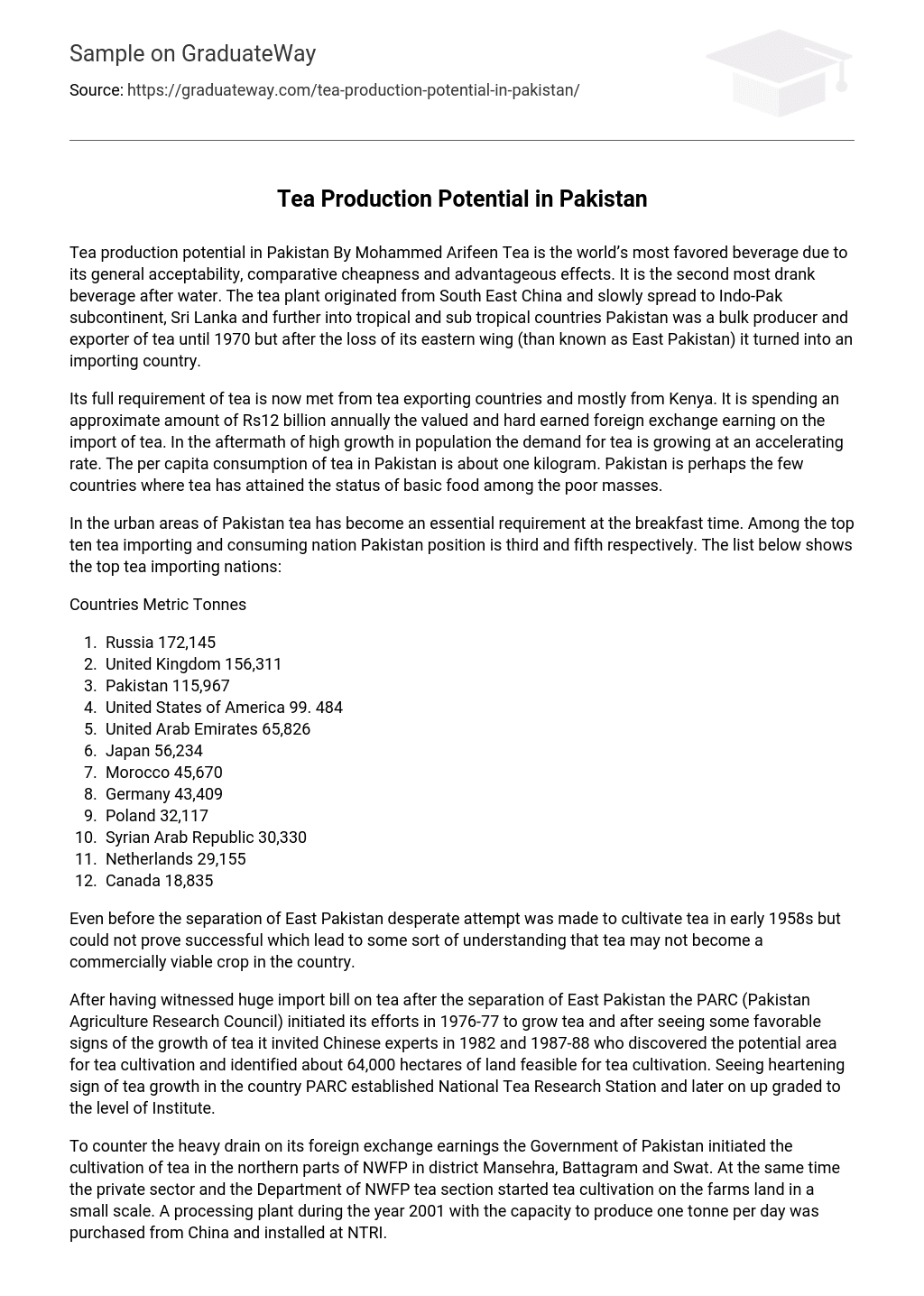Tea production potential in Pakistan By Mohammed Arifeen Tea is the world’s most favored beverage due to its general acceptability, comparative cheapness and advantageous effects. It is the second most drank beverage after water. The tea plant originated from South East China and slowly spread to Indo-Pak subcontinent, Sri Lanka and further into tropical and sub tropical countries Pakistan was a bulk producer and exporter of tea until 1970 but after the loss of its eastern wing (than known as East Pakistan) it turned into an importing country.
Its full requirement of tea is now met from tea exporting countries and mostly from Kenya. It is spending an approximate amount of Rs12 billion annually the valued and hard earned foreign exchange earning on the import of tea. In the aftermath of high growth in population the demand for tea is growing at an accelerating rate. The per capita consumption of tea in Pakistan is about one kilogram. Pakistan is perhaps the few countries where tea has attained the status of basic food among the poor masses.
In the urban areas of Pakistan tea has become an essential requirement at the breakfast time. Among the top ten tea importing and consuming nation Pakistan position is third and fifth respectively. The list below shows the top tea importing nations:
Countries Metric Tonnes
- Russia 172,145
- United Kingdom 156,311
- Pakistan 115,967
- United States of America 99. 484
- United Arab Emirates 65,826
- Japan 56,234
- Morocco 45,670
- Germany 43,409
- Poland 32,117
- Syrian Arab Republic 30,330
- Netherlands 29,155
- Canada 18,835
Even before the separation of East Pakistan desperate attempt was made to cultivate tea in early 1958s but could not prove successful which lead to some sort of understanding that tea may not become a commercially viable crop in the country.
After having witnessed huge import bill on tea after the separation of East Pakistan the PARC (Pakistan Agriculture Research Council) initiated its efforts in 1976-77 to grow tea and after seeing some favorable signs of the growth of tea it invited Chinese experts in 1982 and 1987-88 who discovered the potential area for tea cultivation and identified about 64,000 hectares of land feasible for tea cultivation. Seeing heartening sign of tea growth in the country PARC established National Tea Research Station and later on up graded to the level of Institute.
To counter the heavy drain on its foreign exchange earnings the Government of Pakistan initiated the cultivation of tea in the northern parts of NWFP in district Mansehra, Battagram and Swat. At the same time the private sector and the Department of NWFP tea section started tea cultivation on the farms land in a small scale. A processing plant during the year 2001 with the capacity to produce one tonne per day was purchased from China and installed at NTRI.
Lever Brothers (Pvt) Ltd also procured a processing black tea plant with the capacity to produce one tonne per day. Pakistan Science Foundation, Islamabad installed green tea plant with 100 kilogram per day. The Government has set a plan of launching Rs890 million public-private programme to reduce the heavy tea import bill. Under this medium – term development framework (MTDF 2005-10), tea cultivation would be launched in the suitable areas of NWFP, AJK and FATA areas.
Tea plantation would be made on 4,000 acres by the private sector, 800 and 200 acres by NWFP and AJK extensive department respectively. If implemented in true spirit it would provide enormous economic opportunities to the people in the mountainous areas and alleviate poverty. At present the tea trade is under serious financial strain. Pakistan Tea Association has stated that import of tea under the garb of Afghanistan Transit Trade (ATT) have upset the legal importers of tea. There is a tremendous decline in the legal tea trade due to import of tea from smuggling channel.
According to them some notorious element in the government are definitely involved in these illegal activities, otherwise the huge illegal trade would not have been possible. Smuggling of tea from Afghanistan to Pakistan goes unabated without impunity. The government included tea in the ATT in the year 2004 which has already pushed the illegal trade between Afghanistan and Pakistan. According to Pakistan Tea Association the local markets of tea as a result of tea being smuggled to Pakistan from Afghanistan are facing billion of rupees losses.
The total consumption of tea stands at 175 million kilograms. Out of these 100 million Kilograms of tea are legally imported through government channel and the rest 75 million kilograms of tea is smuggled to Pakistan from Afghanistan. This causes a heavy loss of Rs5. 5 billion to the legal local importers of tea. The Association has demanded that government immediately withdraw 10 percent import duty on tea to resolve this tea crisis. If this situation continues than smuggled tea would ruin the legal tea trade. The country in the end would suffer a colossal financial loss.
Under the circumstances of huge import tea bill annually and large scale of smuggling of tea from Afghanistan to Pakistan the country has no better alternative but to grow tea which has all the environment and the commercial feasibility of growing the best kind of both black and green tea. It is now the time for the government to wake up and initiate all concrete measures in earnestness to actually implement the exercises which it had been doing in the past several years for cultivating tea in Pakistan. This will not require a large begging bowl for help from friendly countries.





